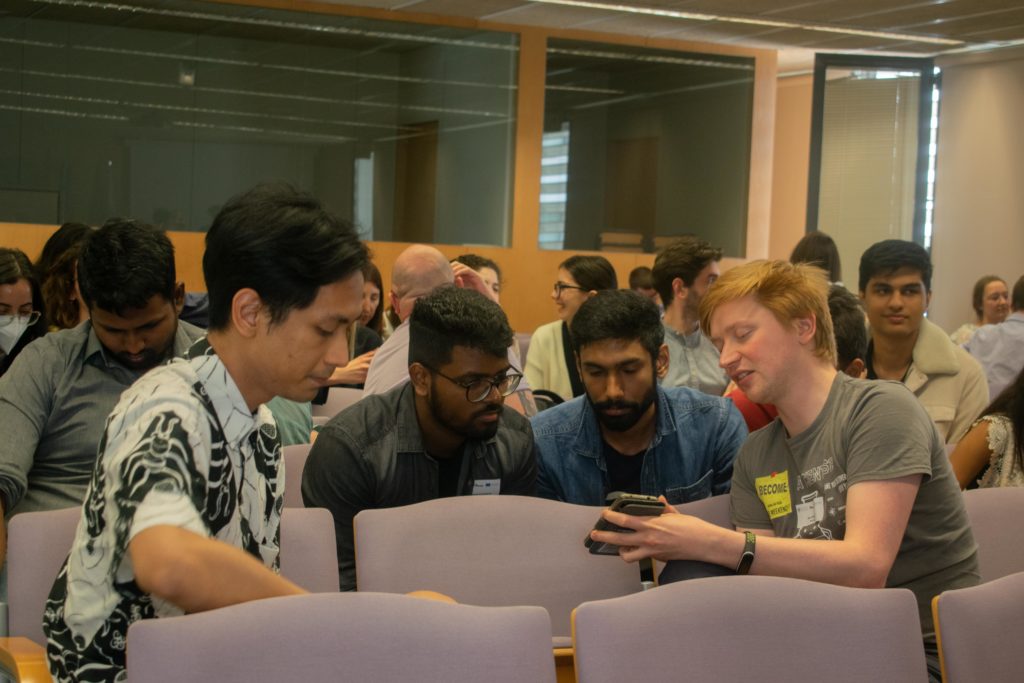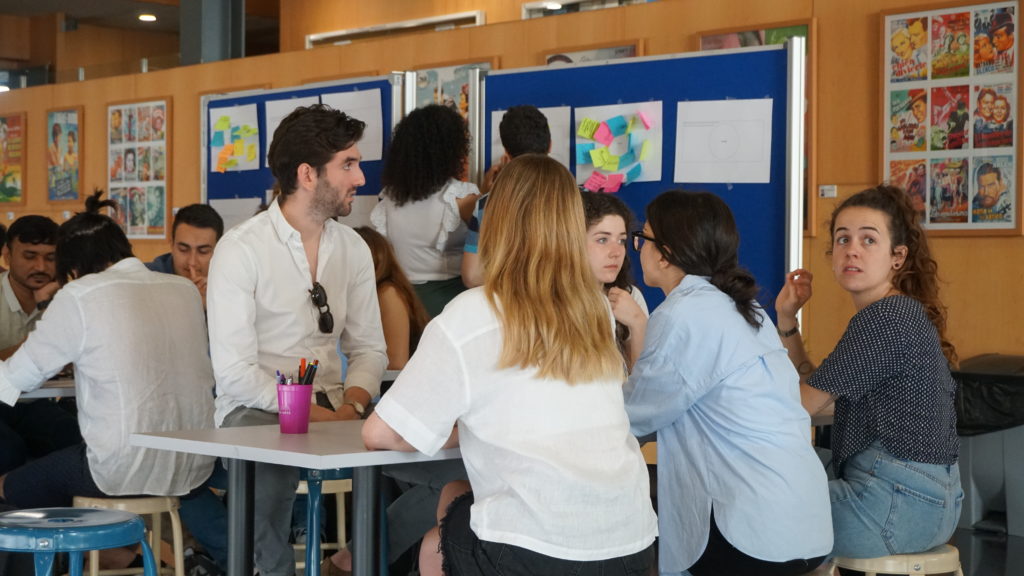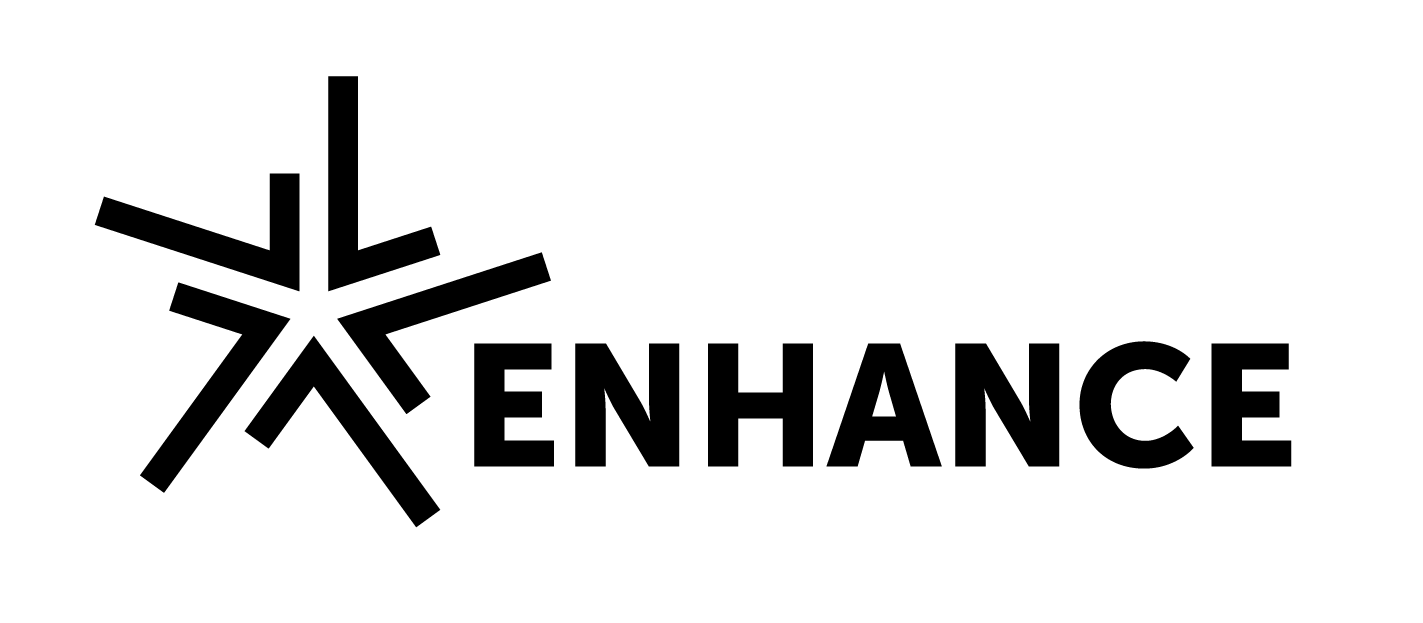
WHAT’S ON?
The ENHANCE Alliance launched two challenges to tackle artificial intelligence and diversity and inclusion at European Education Area. This initiative was integrated into the ENHANCE Higher Education Innovator programme and supported the top six projects presented by teams formed by at least two different Alliance members with 210,000 Euros.
The main objective of the ENHANCE Challenge was to select the most disruptive ideas resulting from the joint efforts of the ENHANCE community. Thus, after being incubated for one year at UPV and NTNU, the awarded ideas were integrated into the ENHANCE Alliance to improve the European Education system.
PARTICIPANTS
Students, academic or administrative staff from any ENHANCE member university, took this opportunity to work an international hybrid competition to tackle the most challenging issues at European Higher Education Institutions (HEIs). It was a unique opportunity to realise the most disruptive ideas to improve the European education system.
The teams tackled two challenges:
Challenge 1: Enhance diversity and inclusion of students with fewer opportunities at the university.
Challenge 2: Enhance the use of artificial intelligence in university administration
Participants joined in teams. Each team consisted of people from at least two different Alliance member universities and a maximum of seven. Gender diversity and diversity in participants’ profiles (student, academic ⎯included teaching staff⎯, or administrative staff ⎯included technical staff-) were highly recommended.
EVENT FORMAT
Phase 0: 28th April 2022 – TEAM UP session, team set up to start the competition.
Phase 1: 5th-6th May 2022 – Up to 210 virtual participants connected online through Slack and Zoom to interact, learn and develop innovative ideas.
Participants had the opportunity to tune in for plenary sessions and engage with asynchronous content to design their thinking process.
Teams delivered pitches addressing one challenge. The best five ideas for each challenge were selected for the final stage in Valencia (UPV Campus).
Phase 2: 24th-25th May 2022 – 10 finalist teams met in Valencia and shared their experiences through keynotes and workshops.
BENEFITS
All participants interacted directly with the professionals through the platform during the two stages of the challenges to learn more about them. A certificate of participation, including 34-hour training (3.4 ECTS), was provided.
The finalist teams (10 teams) received a budget for travel expenses to Valencia and participate in the final, presenting their ideas to an international board.
The top three ideas per challenge funded with up to 35,000 Euros per team. They were rewarded with an incubator programme (2 days training- mentoring for each winning team at NTNU (Challenge 1) and UPV (Challenge 2).
The amount funded depended on the financial needs foreseen by the team. The funds were allocated and managed within the ENHANCE institutions in agreement with the team members. UPV students were awarded with a travel budget to an ENHANCE member university.
ASSESMENT CRITERIA
- Team composition 30%
- Ideas 70%
Applicability to all Alliance partners: 20%
The innovative character of project and quality of organisational change: 20%
Expected outcomes and impact after 1-year project: 15%
Sustainability of the project (economic & environmental drivers): 15%


ENHANCE CHALLENGE 1
Enhance diversity and inclusion of students with fewer opportunities at the university
MAIN INFORMATION
Societal, technological, and environmental transformations are happening at great speed. Universities need to adapt, and ENHANCE wanted to enable the necessary change through the ENHANCE Organizational Change Incubators. To foster bottom-up innovation in university administration, ENHANCE invited administrative staff, academic staff, and students of all 7 member universities to form international teams and develop project ideas in the pilot topic:
ENHANCE DIVERSITY AND INCLUSION OF STUDENTS WITH FEWER OPPORTUNITIES AT THE UNIVERSITY
Diversity and Inclusion are core values of ENHANCE Alliance. We want to become a European University for everyone. This will only be possible when we fully embrace the diversity of people in our alliance and give everyone the same chances to participate in university life without experiencing any barriers. Nevertheless, some specific groups of students experience huge barriers that prevent them from participating. You can find out more about these barriers in the resource documents.
ENHANCE universities are already doing a lot to remove these barriers. But is it enough? How can we remove these barriers altogether? How can we improve our current activities in ENHANCE further? We need new ideas for old problems! This is what we are looking for today! Come and join the #ENHANCEChallenge on Inclusion and Diversity.
Three steps to go:
1.- Read the inspirational resources
2.- Identify on action field
3.- Generate an Idea&work on your solution by “Joining the challenge”
Action fields
1.- Mainstream diversity and inclusion:
This action field focused on finding ways to mainstream diversity and inclusion. How can this topic be a standardised topic to consider in decision-making processes?
How can we reach a higher acceptance for the need of these topics?
2.- Empower underrepresented groups:
This action field focused on the empowerment of underrepresented students especially. How can we empower and encourage them to participate more in university life? Check out the inspirational resources to learn more about who these groups are and their needs.
3.- Offer training for building consciousness:
How can we make the majority of students
Who are not disadvantaged more aware of the problems of those with fewer opportunities?
4.- Use new technologies for more inclusion:
How can new technologies like artificial intelligence help us become more inclusive in organising our universities?
5.- Remove barriers.
This action field focuses on the concrete barriers that students with fewer opportunities face in their daily life. What keeps them away from participating in university activities? Find out more about the identified barriers in the resources below.


ENHANCE CHALLENGE 2
Enhance the use of artificial intelligence in university administration
MAIN INFORMATION
Societal, Technological and environmental transformations are happening at great speed. Universities need to adapt, and ENHANCE wants to enable the necessary change through the ENHANCE Organizational Change Incubators. To foster bottom-up innovation in university administration, ENHANCE invites administrative staff, academic staff, and students of all 7 member universities to form international teams and develop project ideas in the pilot topic:
ENHANCE THE USE OF ARTIFICIAL INTELLIGENCE IN UNIVERSITY ADMINISTRATION
The field of artificial intelligence (AI) is one of the most vibrant research and innovation topics in recent years. As an Alliance of leading Universities of Technology, ENHANCE unites a lot of technical expertise, which we aim to take advantage of through our Incubator Challenge. Together with you, we want to find out how typical AI applications like virtual assistants, chatbots, content moderation systems, image recognition and processing algorithms or security concepts could be used to support the administration or teaching and learning at Higher Education Institutions. We believe that AI can help us build the European University of tomorrow and design this European University as innovative, diverse and sustainable as possible. We are eager for your ideas and encourage you to develop your solution with team members from all across the ENHANCE community. Join the #ENHANCEChallenge on artificial intelligence and show us your vision of the future.
Three steps to go:
- Read the inspirational resources
2. Identify an action field (See below)
3. Generate an idea and work on your solution by joining the challenge!
ACTION FIELDS
For orientation we would like to suggest the following action fields to stimulate your thoughts about AI in Higher Education. But maybe you are thinking about something completely different? No problem! Go ahead and develop your very own idea!
Profiling and prediction:
Many AI applications are leaning models based on the assessment of large data. By creating user profiles, they might be able to predict students’ behaviour, e.g. regarding their course selection or the likelihood of dropping out from a course. Which responsibilities result from such prediction possibilities? How could counselling offers be tailored to support students better?
Which administration offers could be re- designed if we were able to predict the behaviour of learners or maybe also teachers? Which data would be helpful, and under which circumstances should we be allowed to create such profiles?
Assessment and evaluation:
Assessment and evaluation don’t need to only focus on the grading of students. Maybe even more interesting might be how students evaluate lectures and offers. Evaluating learning offers is often difficult as no one likes to fill questionnaires. At the same time, students are often publicly chatting about lectures or are participating in online forums of different courses. Could we use AI to analyse how students communicate about a particular education offer to improve it?
Adaptive systems and personalisation:
Not everybody is learning the same way. While some of us prefer to have a general overview first, others start collecting knowledge based on a specific detail.
Some prefer to study books for hours; others listen to podcasts or need to have a real lecturer explaining scientific contexts.
Intelligent tutoring systems:
Universities are large, complex and (at least in the first semesters) undiscovered systems. Students need support discovering their new environment, and often people working in counselling are answering the same question again and again. How could AI guide the orientation of students in the university system? Could relevant information be organised in a more intelligent way for each student? But also, during classes and courses, students require different information at different times, depending on their learning type. How could AI help to design course content more individually?
Ethical and legal implications:
AI is great and can help us to get better in many ways. But what happens if we hand over more and more responsibility to algorithms and software? Are there any limitations when we expose students and staff to the judgement of AI? How can such concerns be incorporated into our strategies, and which are suitable models of participation for the university community if AI applications are introduced? Of course, this should be a cross-cutting theme for all ideas and solutions developed in our challenge. Still, a convincing model of participation or an idea on how to implement a strategic process towards AI application will be interesting solutions to our challenge as well.


